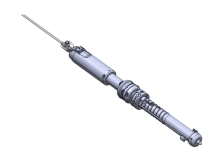The company will use the funds to accelerate integration of AI-generated insights into healthcare systems.
Clinical software company Luceum Health has closed a $7.7m financing round led by Mayo Clinic, Granger Management, and Mercy (St Louis). The funding, which had participation from existing investor Rally Ventures, will be used to advance the company’s clinical artificial intelligence (AI) solution platform.
Lecum Health, part of Mayo Clinic’s portfolio, works with AI innovators to turn data science into point-of-care solutions in healthcare. The North Carolina, US-based company’s platform transforms healthcare data into an AI model, helping clinicians to identify at-risk patients earlier.
AI is a topic of conversation across many industries as algorithms become ever more sophisticated. In healthcare, AI is becoming more prevalent as assistance technology augments patient care.
According to GlobalData, mentions of AI in medical industry company filings experienced a 19% rise in Q1 2023. Healthcare institutions are increasingly turning towards AI systems to help alleviate pressure and lower costs. Indeed, in a 2022 survey conducted by GlobalData, 50% of healthcare industry professionals would prioritise AI over emerging technologies for investments in the next two years.
“AI has tremendous potential to transform and augment how physicians and providers practice medicine, make decisions, and serve their patients. Yet, so far, we have barely scratched the surface of AI’s potential in healthcare,” said Sean Cassidy, founding CEO of Lucem Health. “
Lucem Health also launched Lucem Health Reveal in March 2023. The platform, developed in partnership with Medial EarlySign, uses AI to analyse electronic health record data and identify patients at high risk of serious or chronic disease. Health Reveal’s purpose is to boost upstream patient identification without needing to change existing workflows.
“The future of healthcare is proactive, not reactive, and clinical AI has the potential to transform our industry by reducing dangerous and costly delays in diagnosis and treatment,” said Ori Geva, co-founder and CEO of EarlySign.




